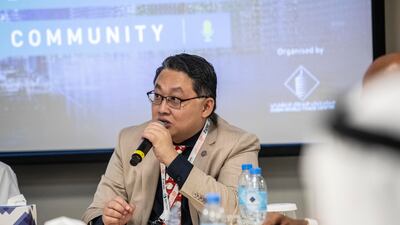Increasing levels of Emiratisation in the private sector could help to boost top talent in the cyber security industry, a senior executive of telecoms equipment maker Huawei has said.
The cyber security industry in the UAE will be able to plug a talent gap by introducing carefully-designed incentives and expanding the Emirati workforce, said Aloysius Cheang, chief security officer for the UAE at Huawei.
"Jobs in cyber security is a hot market, and we have a severe shortage in manpower. We need to do capacity building in cyber security, and we need to train more people and retain the people we train within the system," Mr Cheang told The National at the Gulf Information Security Expo and Conference in Dubai.
"A concern that we have is that after you train people in the UAE, they may stay for a short while [and] then leave for overseas."
The UAE is boosting jobs for the Emirati workforce, particularly within the private sector, as the country seeks to diversify its economy. Last month, Sheikh Mohammed bin Rashid, Vice President and Ruler of Dubai, said the government will provide “additional incentives” to companies supporting the employment of citizens.
In September 2021, the UAE launched a series of initiatives to increase the number of Emirati private sector workers by 75,000, by 2026, as part of the Nafis programme and the broader Projects of the 50 development plan launched earlier that month. In December, it was announced that more than 2,000 Emiratis joined the private sector through Nafis.
"A strong cyber security posture and framework is a critical component for the Projects of the 50," Mr Cheang said.
The government's efforts to improve the labour market are bearing fruit. Emirati professionals are increasingly turning to the private sector for career progression, said a recent report by recruitment consultancy Michael Page.

Jobs in the technology sector are also among the most sought-after, which can be rewarding. A cyber security architect, for example, can potentially earn anywhere from Dh41,000 ($11,164) to Dh52,000 per month in 2022 in the UAE, figures compiled by recruitment agency Cooper Fitch show.
But Emiratisation is not the only solution to retain talent, said Mr Cheang, who earlier delivered a keynote at Gisec.
"There is a need to create a road map for a technical career, because there is room to grow for the talents that are already in the UAE, rather than keep them stagnant," he said.
chief security officer for the UAE at Huawei
"And there should also be what we call industry captains — top leaders in cyber security who will mentor those in the lower levels who aspire to go up the ranks."
The pace of digitalisation will require all stakeholders, not just governments but also industries, taking the lead to create a stable ecosystem, Mr Cheang said.
More professionals are also needed in cyber security as the risks of cyber warfare grows amid the continuing Russian military offensive in Ukraine.
"Last year people were talking about ransomware; now we’re talking about state-sponsored attacks as well. There’s a lot of spillover that can happen from a cyber conflict," Mr Cheang said.
"You can’t control the precise target of what will be hit by a physical attack — let alone a cyber attack."


